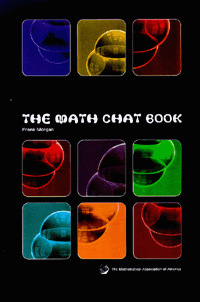- About MAA
- Membership
- MAA Publications
- Periodicals
- Blogs
- MAA Book Series
- MAA Press (an imprint of the AMS)
- MAA Notes
- MAA Reviews
- Mathematical Communication
- Information for Libraries
- Author Resources
- Advertise with MAA
- Meetings
- Competitions
- Programs
- Communities
- MAA Sections
- SIGMAA
- MAA Connect
- Students
- MAA Awards
- Awards Booklets
- Writing Awards
- Teaching Awards
- Service Awards
- Research Awards
- Lecture Awards
- Putnam Competition Individual and Team Winners
- D. E. Shaw Group AMC 8 Awards & Certificates
- Maryam Mirzakhani AMC 10 A Awards & Certificates
- Two Sigma AMC 10 B Awards & Certificates
- Jane Street AMC 12 A Awards & Certificates
- Akamai AMC 12 B Awards & Certificates
- High School Teachers
- News
You are here
Frank Morgan's Math Chat - Guessing the Red Card
 |
 |
February 21, 2002
OLD CHALLENGE. Your opponent has a standard deck of 52 cards, half red and half black. He shuffles the deck thoroughly and turns the cards over one at a time. Your goal is to predict a red card just before it is turned over. What is your best strategy?
ANSWER (Joseph DeVincentis and Jonathan Falk). It doesn't matter: every strategy has 50% probability of success! You could just predict that the first card is red. If you wait, and the first card is red, your chances get worse; but if the first card is black, your chances get better; so on the average your chances stay the same.
This puzzle and others appear in an article by Peter Winkler called "Games people don't play," in a wonderful new book tribute to puzzle master Martin Gardner called "Puzzler's Tribute: A Feast for the Mind." Raymond Smullyan provides some of his most shocking tricks and logical paradoxes. James Propp gives a layman's glimpse of Wiles's proof of Fermat's Last Theorem. John H. Conway describes his famous Doomsday method for quickly telling the day of the week of any date in history. It is based on the principle that in any year, the following dates all fall on the same day of the week:
the last day of February (March 0),
4/4, 6/6, 8/8, 10/10, 12/12,
7/11, 11/7, 5/9, 9/5 ("The 7-11 is open from 9 to 5.")
This year, that day of the week, which Conway calls Doomsday, is Thursday, the same day Math Chat appears. So 12/12, 12/19, and 12/26 are Thursdays, and Christmas for example falls on Wednesday.
Derek Smith (Math Chat staff) reports: The red card prediction problem was one that I was asked as part of an interview with the New York City financial firm D. E. Shaw. According to their web page, "Hiring is extremely selective, with less than one candidate in 250 ultimately invited to join the firm." Shaw was a fast-growing statistical arbitrage company in the mid 90's. Since then, I think things have not been as good for them. I'm glad that I wasn't one-in-250, since I heard that a month after I would have started, about 40% of the company came into work one morning and couldn't log on to their computer accounts. That's how they knew they'd been fired.
During the same interview I was asked to describe a way to do the five-card trick described on page 181 of "Puzzler's Tribute," in the article by Brain Epstein.
QUESTIONABLE MATHEMATICS. John Sullivan reports that an Edupage email newsletter describes the new Pittsburgh supercomputer as performing "6 trillion teraflops per second." (Of course they mean 6 teraflops; a teraflop is already a trillion flops.)
Readers are invited to submit more examples of questionable mathematics.
NEW CHALLENGE (Dean Thomas). Describe a practical way of picking a member of the Earth's population at random.
Copyright 2002, Frank Morgan.
Send answers, comments, and new questions by email to Frank.Morgan@williams.edu, to be eligible for Flatland and other book awards. Winning answers will appear in the next Math Chat. Math Chat appears on the first and third Thursdays of each month. Prof. Morgan's homepage is at www.williams.edu/Mathematics/fmorgan.
THE MATH CHAT BOOK, including a $1000 Math Chat Book QUEST, questions and answers, and a list of past challenge winners, is now available from the MAA (800-331-1622).




